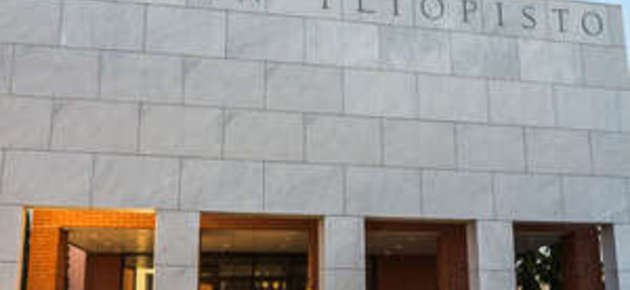Letter of intent on transferring University of Vaasa language studies to the University of ...


Finnish universities are in the midst of a significant structural reform driven by the strategic profiling of higher education institutions and the strengthening of future competitiveness. The Universities of Vaasa and Jyväskylä are meeting these challenges by preparing to transfer the University of Vaasa’s degree education and research in languages to the University of Jyväskylä.
– The University of Vaasa aims at conducting high-level research and educating competitive experts. Specialisation is a natural part of the development of universities, and it is a way to ensure internationally high-quality research and education also in the future. The intention is to continue degree education and research in languages at the University of Jyväskylä. This applies to English, German and Scandinavian languages as well as Modern Finnish. However, the instruction of other languages will remain part of the offerings of Vaasa, and the operations of our Language Centre will be developed to a new level, says Jari Kuusisto, Rector of the University of Vaasa.
– In the same context, both universities will receive strategic funding from the Ministry of Education and Culture to develop their own competence areas. For the University of Vaasa this means in practice that the volume of its operations may slightly increase, Kuusisto continues.
New opportunities for language students
The intention is for the change to take effect from 1 August 2017 as a transfer of business. The reform will affect about 700 students and 40 staff members. According to the letter of intent, the staff will be transferred to the University of Jyväskylä with unchanged terms of employment, and no one will be laid off. The University of Jyväskylä will offer all language students of the University of Vaasa the opportunity to transfer to the University of Jyväskylä from the 2017 academic year. Students can also finish their studies in Vaasa during the transitional period.
– Both universities are strengthening their positions as attractive and significant employers in the region. The University of Vaasa will remain the same size, and the staff will be oriented even more clearly to the University’s areas of strength. For those transferring to Jyväskylä, the reform offers a diversity of career opportunities in the University of Jyväskylä’s competence areas of language and cultural education and research. The change also offers those language students transferring to Jyväskylä more extensive opportunities in their own field to develop their competence and specialise through, for example, minor subject choices. The 12 months after the letter of intent have been reserved for preparing the change jointly with students, the student union and staff, says the Rector of the University of Jyväskylä Matti Manninen.
A final decision on the reform will be confirmed during autumn 2016, when the Ministry of Education and Culture has made a decision on changing the educational responsibilities. Information will be regularly provided on the progress of the change in both universities.
Further information:
Jari Kuusisto, Rector of the University of Vaasa, +358 29 449 8291
Johnny Åkerholm, Chairman of the Board, University of Vaasa, +358 40 838 6079
Hannu Katajamäki, Dean, University of Vaasa, +358 29 449 8338
Interview requests for the University of Vaasa: Maria Mäkelä, Communications and External Relations, +358 29 449 8112.
Matti Manninen, Rector of the University of Jyväskylä, +358 40 6800 215
Kirsi Moisander, Director of Administration, University of Jyväskylä, +358 40 805 4455
Minna-Riitta Luukka, Dean, University of Jyväskylä, +358 40 805 3205
Interview requests for the University of Jyväskylä: Director of Relations Anu Mustonen, +358 50 564 9022.
University of Vaasa
The University of Vaasa educates responsible leaders and experts for the needs of the future. According to the new strategy, research and education at the University of Vaasa has three areas of focus: management and change, energy and sustainable development, and finance and economic decision-making.
The University of Vaasa began its operations as the School of Economics and Business Administration in 1968. The University currently hosts about 5,400 students and 500 staff members. About 12% of the students and 18% of the academic staff are international, and the University offers several master’s degree programmes with instruction in English. The Faculty of Business Studies is the largest faculty. Cooperation with the regional energy cluster is the strength of the field of technology. The field of administration has long traditions in developing public administration.
Degree education in languages at the University of Vaasa
The research focus of languages in Vaasa is multilingualism, particularly immersion research, research on professional discourse and special languages, terminology research, and research on languages and cultures. Research has been developed through wide-ranging research groups and intensive research teams within the groups. This connects research interests strongly to both the regional and the societal reality, without forgetting an international, particularly a Scandinavian orientation. The fact that Ostrobothnia is bilingual gives research a special character.
Language teaching at the University of Vaasa is networked, multidisciplinary and relevant to the needs of working life, the emphasis being on multilingualism, special languages, and translation and culture. Language education is implemented in multidisciplinary programmes, in which competence in languages is integrated with the strengths of other subjects at the University. An example of this is the opportunity to specialise in administrative tasks focused on Swedish. The University is Finland’s only university to educate language immersion teachers and experts. The education is carried out in cooperation with Åbo Akademi University.
Current bachelor’s programmes in languages and communication:
- Kotimaiset kielet (National languages)
- Saksan kieli ja kulttuuri (German language and culture)
- Viestintä, nykysuomi ja englanti (Communication, modern Finnish and English)
- Kielikylpykoulutuksen koulutusohjelma (Language immersion)
Current master’s programmes in languages and communication:
- Kieliasiantuntijuus erikoistuneessa yhteiskunnassa (Language expertise in a specialised society)
- Kielikylpykoulutuksen koulutusohjelma (Language immersion)
- Ruotsin kielen ja kielikylvyn maisteriohjelma (Swedish language and immersion)
- Viestinnän monialainen maisteriohjelma VIMA (Multidisciplinary master’s degree programme in communication)
- Tekninen viestintä TEVI (Technical communication)
- Comparative Cultural Studies
- Master’s Programme in Intercultural Management and Communication
In languages and communication, 95 bachelor’s degrees, 84 master’s degrees and 3 doctoral degrees were completed in 2015.
University of Jyväskylä
The University of Jyväskylä has its roots in the first Finnish-language teacher training college, Jyväskylä Teacher Seminary, founded by Uno Cygnaeus in 1863. The University is Finland’s leading expert in teacher education and adult education, as well as the major exporter of education. The Faculty of Sport and Health Sciences is the only one of its kind in Finland. Based on its student recruitment, the University of Jyväskylä attracts students from all over Finland. The number of students is nearly 15,000 and that of staff 2,400.
The University of Jyväskylä will renew its organisation from 1 January 2017. The Faculty of Humanities and Social Sciences will then be the largest of the University with its 3,750 students. The new Department of Language and Communication Studies will have about 20 professors and 120 members of research and teaching staff. The new department will have nearly a thousand active bachelor’s and master’s students and around 140 doctoral students. Research at the Department of Language and Communication Studies will focus on language usage and learning, communication and journalism, while education will prepare language teachers, journalists and other experts with multidisciplinary competence in languages, communication and interaction.
The research focuses include applied linguistics as well as communication and media in a networked world. Research on applied language studies is one of the University’s groups of outstanding international level. The focus areas of research are language acquisition and teaching as well as discourse studies. These areas share the view of language as social action, which is examined using a multidisciplinary research approach. The research results provide answers to challenges posed by language learning and teaching as well as changing language practices and environments in schools, workplaces and the media. Furthermore, the department’s research focuses on the significance of language for the individual and communities, and how transformation in society affects language, language acquisition, teaching and usage. The multidisciplinary research responds to the challenge of evolving multilingualism in society. Research in communication studies addresses workplace interaction and the significance of communication technology and internationalisation for communication and the media.
With financing from the Academy of Finland, the department is undertaking the profiling project ‘Applied language studies for the changing society’ together with the Centre for Applied Language Studies.
According to the present plans, the department’s study options that can be applied for in spring 2017 are the following: the programmes for foreign language subject teacher, mother tongue and literature teacher, multidisciplinary language expert, Finnish sign language expert, and communication and journalism. In addition, the department has two international master’s degree programmes: Intercultural Communication (ICC) and Applied Language Studies in the Changing Society (APPLANG). The department’s major subject offering in languages comprises English, Romance philology, Swedish, German language and culture, Finnish Sign Language, Finnish, Finnish language and culture, and Russian language and culture. In addition, master’s and doctoral degrees can be completed in applied linguistics. Minor subjects include Spanish, Italian and Latin. The major subjects offered in communication are speech communication, journalism and intercultural communication.
The average number of bachelor’s degrees completed at the department each year is 190; for master’s degrees the number is about 200 and for doctoral degrees 11.